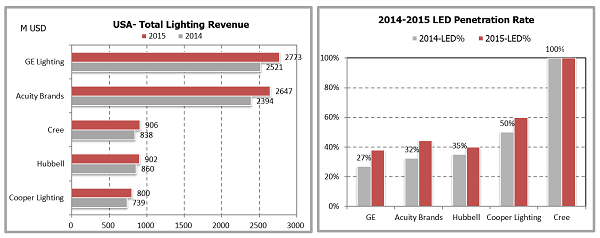(Author: Judy Lin, Chief Editor, LEDinside)
GE Lighting CEO Bill Lacey announced in an internal memo to employees that it will be withdrawing from Asia and Latin America Markets as of Nov. 30, 2016, reported China Association of Lighting Industry (CALI).
LEDinside confirmed from industry sources that the head of GE Lighting had sent the memo to employees.
In the memo, Lacey stated GE Lighting will be focused on securing its market position in its top three regional markets North America, Europe, Middle East regions instead.
 |
|
Left: Top U.S. LED lighting brands revenue comparison in 2014-2015. Right: Top brands LED market penetration rates. (Source: LEDinside Silver Report) |
The U.S. market is GE Lighting’s top revenue source contributing to 55% of its US $2.86 billion revenue in 2015, followed by Europe (25%), and other regional markets (12%), according to data compiled by LEDinside.
The company’s revenue from Asia contributes to less than 18% of revenue share, in which the China market alone contributed more than a third amounting to 8%.
Broken down by lighting application segments, most of GE Lighting’s revenue in Asia is from LED bulbs, LED tube lights sold through hardware distributuion channels comprise 48%, trailing in second is retail lighting 20%, and industrial lighting’s 13%.
GE Lighting drops less profitable and intensely competitive Asian market
According to LEDinside observations, European and U.S. LED lighting manufacturers’ products are often less price competitive than Chinese counterparts in the Asian market, making it more difficult for Western companies to clinch market shares in this price sensitive market.
In recent years, general LED lighting products profitability have been diluted by large number of Chinese competitors in the Asian market, which has driven down products end retail prices.
For instance, 40W LED bulb prices dropped 2% in China to an average sales price of US $3.4 in July 2016, compared to the global average of US $9.4 during the same period, according to data compiled by LEDinside.
Moreover, Chinese LED lighting imports tariff free status in Southeast Asia following the conclusion of ASEAN–China Free Trade Area talks in 2015, has given Chinese companies further pricing advantages in the fragmented Asian market.
GE Lighting strategy focuses on profitable smart LED lighting
Declining LED lighting product profits over recent years, due to rising market competition urged top LED manufacturers including Philips Lighting, Osram and GE Lighting to turn to more profitable lighting products and direct attention to niche lighting markets.
In the same memo, Lacey stated GE would be setting up a new innovative R&D lab to accelerate LED lighting technology and develop connected lighting products for smart homes.
Under the plan, GE Lighting intends to start testing related products, and develop a new ecosystem by collaborating with different R&D partners to develop a smart and flexible smart lighting solution.
Tumbling market demands for traditional luminaire products including incandescent bulbs, halogen, and CFL bulbs, and the phase out of incandescent in 2007 in U.S. has driven GE Lighting to focus on its more profitable LED lighting business. GE Lighting estimated LEDs will make up half of the company’s revenue in U.S. or 80% of its global revenue by 2020.
In its transition to focus on LED lighting, GE Lighting has shut six traditional bulb manufacturing plants in U.S, including incandescent and halogen bulb plants in August 2016, which is estimated to affect 640 jobs. Many of the plants were operating at below 50% of production capacity, said Alicia Gauer, senior manager of communications for the company.
In addition, tumbling traditional lighting market demands resulted in GE Lighting’s decision to withdraw from CFL sector on Feb. 2 2016.
LED lighting revenue reportedly contributed to US $886 million of GE Lighting’s US $2.86 billion revenue in 2015.
Signs of GE Lighting’s shifting focus to profitable smart lighting and integrated lighting systems can be observed in the spin-off of GE Current which integrates its LEDs, Solar, Energy Storage and Electric Vehicle businesses with its industrial strength Predix platform on October 5, 2015.
LEDinside projects the global smart LED lighting market will become the fastest growing niche lighting market from 2016 to 2020, escalating from US $2.35 billion to US $13.43 billion during this time frame.
GE Lighting’s decision to exit less profitable regional markets is largely driven by its market strategy to focus its resources on more lucrative regional markets, products, and in-line with its smart lighting product development strategies.












